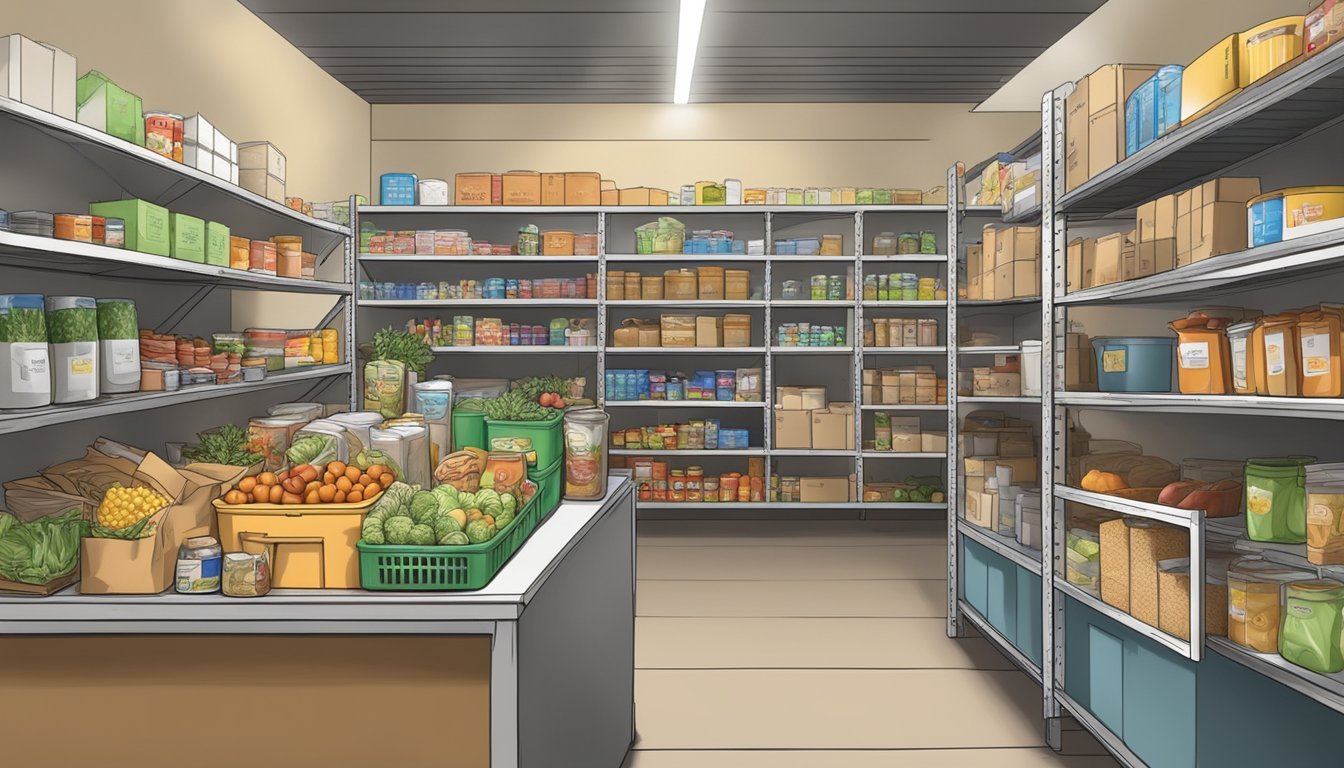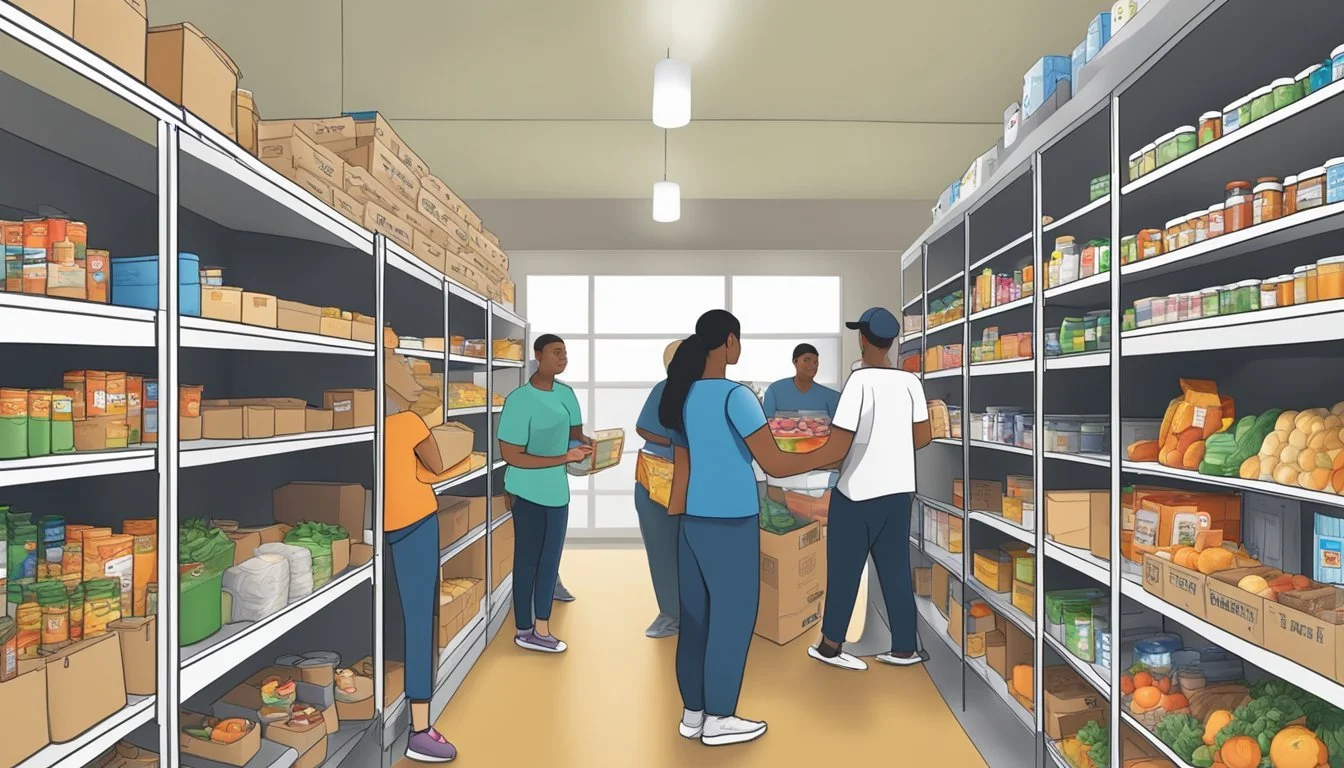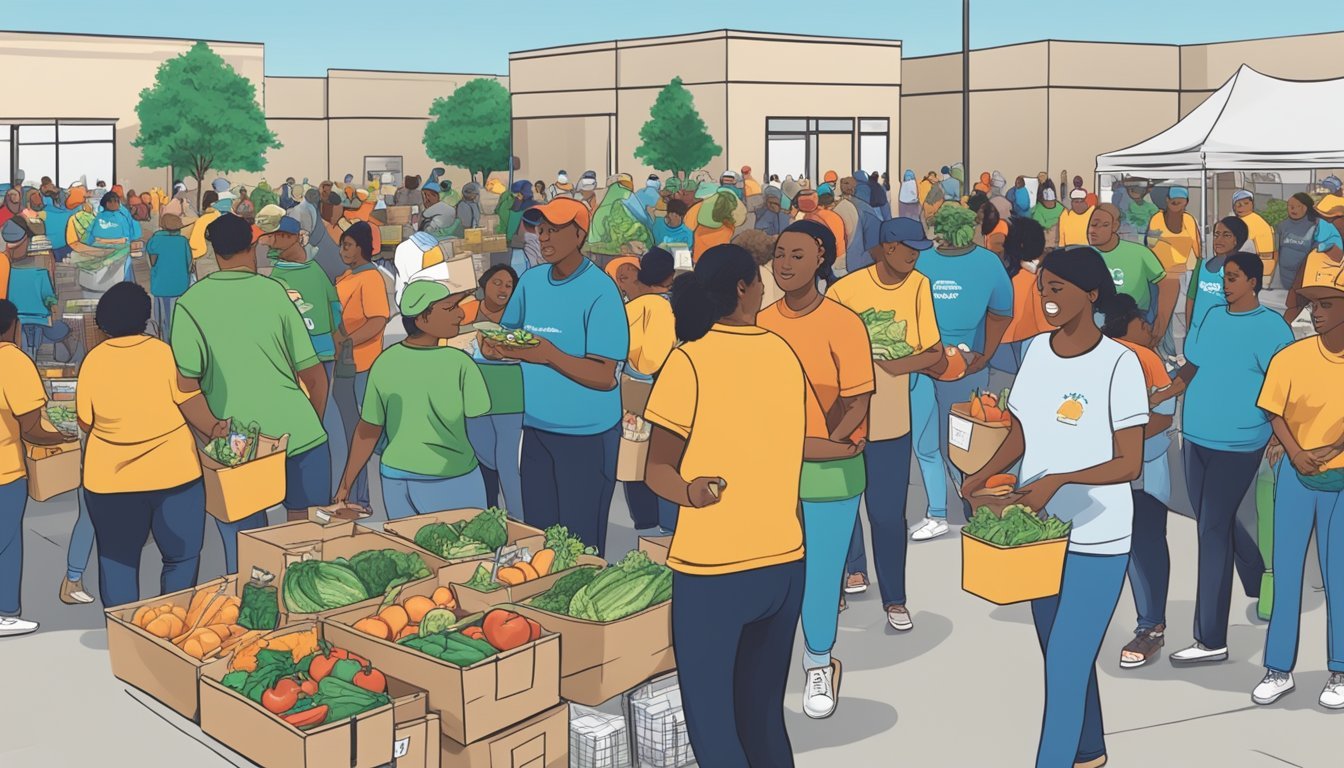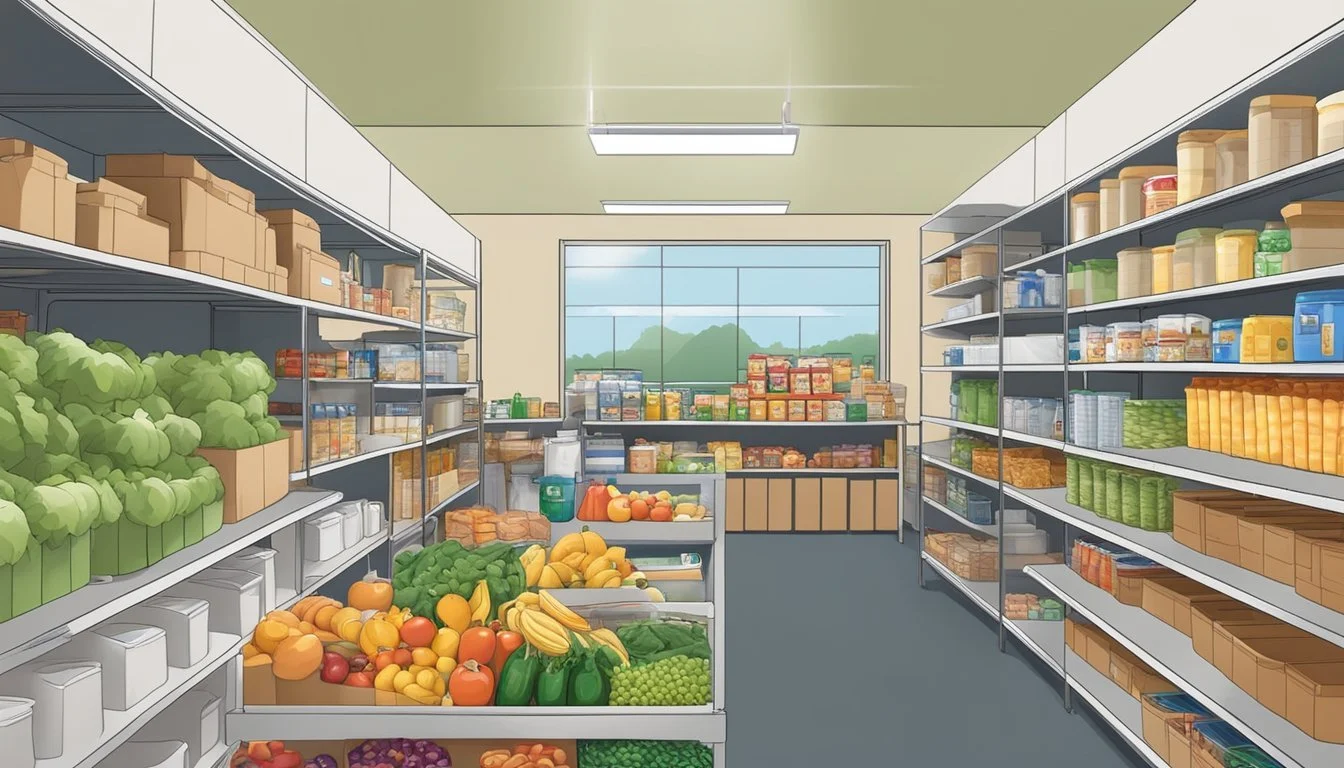Free Groceries and Food Pantries in Travis County, Texas
Your Essential Guide
This Article is Part of Our Guide on Free Groceries in Texas
Travis County, Texas, is actively addressing food insecurity by hosting a constellation of food assistance programs aimed at helping residents access free groceries. These initiatives, often run by local community centers, nonprofits, and partnership programs, provide a lifeline for families and individuals who find themselves struggling to make ends meet. They offer an essential service to the community, ensuring that nutritious food is available to those in need.
Food pantries in the region operate with varying schedules and modalities, from traditional shelf-select pantries to innovative home delivery services aimed at reaching a wider demographic, including those with mobility challenges. In a county where the food insecurity rate stands at 17.1%, slightly above the national average, the availability of these services plays a crucial role in sustaining the well-being of the community.
Collaboration among food banks, charitable organizations, and local government units, like the Travis County Community Centers, foster a network that not only distributes free groceries but also instills hope. This community-driven approach is fundamental in ensuring that all residents of Travis County have the sustenance they need while fostering a sense of community and mutual support.
Understanding Food Insecurity in Travis County
In Travis County, Texas, food insecurity remains a pressing issue. It is defined by a lack of consistent access to enough food for an active, healthy life, and is particularly concerning given the basic needs of families and individuals in the area. Despite the affluence of Austin, the county's largest city, a significant portion of the population struggles with hunger.
Statistics Highlighting the Issue:
Approximately 17% of Travis County residents are food insecure.
40% of impoverished families lack reliable access to nutritious food.
Families with incomes up to 185% of the Federal Poverty Level (FPL) exhibit considerable food insecurity.
This represents a challenge in an area that prides itself on community and economic vibrancy. While local organizations and food pantries provide financial assistance and free groceries, the problem persists due to systemic issues, including income disparities and high living costs.
In response, Travis County has witnessed a variety of initiatives aimed at addressing the root causes of hunger in the community. These programs also focus on education and advocacy, recognizing that a long-term solution involves more than just meeting immediate food needs.
Key Points for Travis County Residents:
Hunger Around Us: A real and present concern, impacting neighbors and friends.
Basic Needs: Many residents are unable to meet fundamental requirements for nourishment.
Austin, Texas: A city facing the paradox of growth alongside increasing demands on food banks.
Financial Assistance: Community services are available but require more support to fully address the need.
Understanding the complexities of food insecurity in Travis County leads to better-targeted efforts to reduce hunger and provides a foundation for sustainable solutions.
Overview of Food Assistance Programs
Travis County offers a robust network of food assistance programs ranging from federal and state aid to local community efforts and non-profit services. These programs provide vital support to individuals and families facing food insecurity.
Federal and State Assistance
SNAP Benefits (Supplemental Nutrition Assistance Program): Known commonly as food stamps, SNAP provides financial aid to purchase groceries. Applications and eligibility information are accessible through YourTexasBenefits.com.
WIC (Women, Infants, and Children): A program dedicated to assisting pregnant women, new mothers, and young children with nutrition education and free healthy food.
Local Community Initiatives
Central Texas Food Bank: Partners with local agencies to distribute free food across the region. They operate various programs to tackle hunger, including food pantries and drive-through distributions.
Drive-Thru Pantries: These provide a selection of nutritious food directly to individuals in their vehicles, as noted by Feeding America.
Non-Profit and Faith-Based Resources
Food Pantries: Various local organizations such as St. Elizabeth's St. Vincent de Paul in Pflugerville, offer limited-hour pantry services to those in need.
Meals on Wheels: This service delivers prepared meals to seniors and individuals with disabilities, ensuring access to healthy foods.
Feeding America: A nationwide network that aids local food banks, including those in Travis County, in supplying free food to the community.
These programs collectively cater to the diverse needs of Travis County residents, ensuring that no one has to face hunger alone.
List of Food Pantries in Travis County
Travis County houses various food pantries that provide nutritional assistance to residents facing food insecurity. These pantries offer critical support through free groceries and services. The details below outline specific information for each food pantry mentioned.
Austin Spanish Seventh Day Adventist
Address: To be determined based on current location
Contact Information: To be determined based on current location
Hours of Operation: To be determined based on current location
Eligibility Requirements: To be determined based on current location
Services Offered: Typically includes a selection of fresh produce, canned goods, and other food items.
Covenant United Methodist Church
Address: Austin, TX - 78727
Contact Information: (512) 346-3124
Hours of Operation: Wednesday 5:30pm - 7:00pm
Eligibility Requirements: Call for details
Services Offered: Operates a food pantry available to those in need of assistance.
North Austin Christian Church
Address: To be determined based on current location
Contact Information: To be determined based on current location
Hours of Operation: To be determined based on current location
Eligibility Requirements: To be determined based on current location
Services Offered: Food pantry services, typically offering a range of nutritious food options.
Manos De Cristo
Address: To be determined based on current location
Contact Information: To be determined based on current location
Hours of Operation: To be determined based on current location
Eligibility Requirements: To be determined based on current location
Services Offered: Known for providing food assistance along with dental and educational services.
Westover Hills Church of Christ
Address: To be determined based on current location
Contact Information: To be determined based on current location
Hours of Operation: To be determined based on current location
Eligibility Requirements: To be determined based on current location
Services Offered: Offers food support among other community services to those in need.
Specialized Food Assistance Services
In Travis County, Texas, a range of specialized food assistance services cater to the unique needs of various community members, including seniors, families with children, and individuals who are homeless or have disabilities.
Support for Seniors
Travis County offers food aid programs designed specifically for senior citizens. These services often include home delivery programs to ensure that older adults without transportation means can still receive nutritious groceries. Eligibility requirements may apply, such as age thresholds, typically focusing on individuals who are 60 years or older.
Assistance for Families with Children
Access to nutritionally balanced food is critical for children's development. Several pantries in Travis County provide emergency food assistance, where families can obtain essentials including baby formula. The service may operate as a drive-thru or walk-up during designated distribution hours.
Essentials for infants: Baby formula, baby food
Nutrition education: Resources for families to learn about healthy eating
Resources for the Homeless and Disabled
Organizations within Travis County recognize the additional barriers faced by the homeless and disabled when seeking food assistance. They make services as accessible as possible, often offering food once every 30 days and requiring that recipients bring their own bags. COVID-19 safety measures are also taken into account, with some centers requiring appointments to limit contact and promote social distancing.
Homeless individuals: Food pantries offering walk-up assistance
People with disabilities: Accessibility features, possible food delivery options
How to Access Food Assistance
Residents of Travis County, Texas, in need of food assistance have several resources available to them. They can locate free food options and obtain groceries through various programs and pantries.
Food Banks and Pantries: A primary resource is the local food banks partnered with Feeding America. Individuals can find food now by entering their zip code on the Feeding America website to discover nearby food distribution locations and their hours.
Travis County Food Pantries: A guide to access a network of supportive pantries includes locations, operations hours, and services offered.
Saint Vincent de Paul: Operates a pantry with specific hours, including free drive-thru options in Austin, TX.
Salvation Army: Offers multiple food pantries and soup kitchens throughout Travis County for residents and the homeless.
Appointments: Some community centers may require an appointment for food assistance, ensuring proper social distancing during the visit.
Transportation: Access to these services might require personal transportation or public transit. Check local transit options if transportation is needed.
SNAP Benefits: For help with food stamps, known as the Supplemental Nutrition Assistance Program (SNAP), residents can inquire about eligibility and support for applying. Assistance is available by calling 211 or visiting the Texas Health and Human Services website.
Home Delivery Program: The Central Texas Food Bank offers a home delivery program for eligible residents, distributing monthly food boxes directly to participants' doorsteps through a contactless delivery service.
Contributing to the Solution
In Travis County, Texas, individuals have various ways to contribute to the community's effort in combating food insecurity. Whether through volunteering time or making donations, every bit of help has a tangible impact on the lives of those in need.
Volunteer Opportunities
Travis County hosts a wealth of volunteer roles, from working in community kitchens to educating the public on nutrition. They can participate in garden projects that supply fresh produce to food pantries or assist at mobile food pantry events, serving as on-site pantry volunteers. Dedicated individuals might also take up roles as volunteer ambassadors, engaging with the community to raise awareness.
On-Site Pantry Volunteer: Individuals can help organize and distribute food directly at pantry locations.
Community Kitchen Aid: Volunteers may assist in meal preparation and service.
Garden Project Worker: Contributing to the growth and harvest of fresh produce.
Mobile Food Pantry Staff: Aid in the setup and operation of mobile food distributions.
Volunteer Ambassador: Serve as a spokesperson to promote pantry events and needs.
Donation Options
Travis County's food assistance initiatives thrive on generous donations from the public. Monetary contributions directly fund the purchase of groceries and necessary supplies. Physical donations of non-perishable food items are critical as well, and community members can even contribute by organizing fundraiser events to support these causes.
Monetary Contributions: Essential for funding both immediate food purchases and long-term program initiatives.
Food Donations: Non-perishable items can be dropped off or delivered to various pantry sites.
Fundraisers: Individuals or groups can organize events with proceeds benefiting the food assistance programs.
Every donation, whether it's time, funds, or food, helps strengthen the county's ability to ensure no one goes hungry.
Extension and Education Programs
Travis County, Texas, has established a variety of extension and education programs aimed at enhancing the nutritional well-being and culinary skills of its residents. These programs are tailored to offer both knowledge and practical experience in the fields of nutrition and cooking.
Nutritional Education Initiatives
Travis County offers Nutritional Education Initiatives primarily through the Expanded Food & Nutrition Education Program (EFNEP). EFNEP targets limited-resource families with young children, helping them to develop skills and knowledge for nutritionally sound diets. The focus of the initiative is on instilling healthy food choices, which leads to improved dietary behaviors and contributes to the overall nutritional wellness of families.
Key Elements of the Program:
Acquisition of nutritional knowledge
Development of healthy eating attitudes
Implementation of budget-friendly meal planning
Hands-on cooking demonstrations
Moreover, organizations like the Green Corn Project of Austin, Texas engage the community through educational efforts related to sustainable farming, thereby touching upon nutritional aspects through the cultivation of healthy, organic food.
Culinary Training Programs
Culinary training programs in Travis County serve to enhance residents' cooking skills, which directly benefits their ability to prepare healthy and cost-effective meals. These programs often include cooking classes and workshops designed to teach the basics and intricacies of meal preparation, with an emphasis on using nutritious ingredients.
Program Benefits:
Improvement of cooking techniques
Education on ingredient selection
Preparation of diverse, healthy dishes
Educational entities promote these programs to foster self-sufficiency, aiming to empower individuals to make better food choices and improve their overall dietary habits.
Community Engagement and Partnerships
In Travis County, Texas, the synergistic relationships between community kitchens, gardens, events, and an extensive partner network form the backbone of an effective food assistance system. This network not only offers immediate relief through food pantries but also builds sustainability through community engagement.
Community Kitchens and Gardens
Community kitchens in Travis County serve as both a gathering space for educational programs and a hub for meal preparation, which helps provide nutritious food to those in need. They operate in collaboration with various partner agencies and utilize produce from local community gardens. These gardens are not just sources of fresh produce but also function as learning and gathering spaces, promoting community involvement and knowledge sharing on sustainable food practices.
Our Partners: Local non-profits, faith-based organizations, and volunteers.
Our Solutions: Education on nutrition, cooking classes, and emergency food preparation.
Events and Fundraisers
Fundraisers and events are crucial for sustaining the services offered by food assistance programs in Travis County. Through these initiatives, they raise awareness, funds, and food donations, supporting a robust food hub system. Program partners often include local businesses, schools, and civic organizations, working together to organize food drives and public engagement events that help to strengthen the food security network.
Program Partners: Businesses, schools, and civic groups.
Partner Agency: Central Texas Food Bank and associated entities.
Each event and partnership contributes to the resilience of Travis County's food assistance endeavors, ensuring that community support continues to extend far beyond the walls of any single pantry or garden.
Resources and Contact Information
Travis County offers a variety of resources for food assistance through numerous food pantries and support services. Accurate contact information and clear communication channels are established to ease access to these necessities.
Directories and Support Services
Several entities serve as resource centers and directories for residents in need. Covenant United Methodist Church and St. Elizabeth SVDP are included in this network, providing food pantries with specified operating hours.
Covenant United Methodist Church
Address: Austin, TX - 78727
Phone: (512) 346-3124
Pantry Hours: Wednesday 5:30pm - 7:00pm
St. Elizabeth SVDP
Address: 1520 Railroad Ave., Pflugerville, Texas 78660
Phone: 512-251-9838
The Central Texas Food Bank operates a Home Delivery Program, with monthly food boxes delivered via contactless delivery. Residents can enroll for this service to receive a consistent supply of groceries.
Central Texas Food Bank
Contact Us: Via their official website or service insights portal
Delivery Details: Monthly, contactless, doorstep delivery by Amazon
Communication and Feedback
Residents are encouraged to reach out to the provided contact details for further assistance or to schedule appointments. Most pantries request callers to schedule in advance, ensuring organized assistance and maintaining recent communications with the community.
Hope Food Pantry Austin
Contact Us: Information available on their official website
Travis County Health & Human Services
Contact Information: Available through findhelp.org
Service Notes: Food is available once every 30 days with a scheduled appointment. Carry your own bags.
Providing a central directory and maintaining a feedback mechanism allows these entities to adapt and respond to the community's needs effectively.
Additional Services and Programs
Beyond providing food relief, Travis County hosts a variety of programs aimed at stabilizing families and individuals facing hardship through comprehensive social and legal services as well as housing and furniture assistance.
Social and Legal Services
In Travis County, social services include a myriad of support systems encompassing financial assistance and case management. Organizations such as Foundation Communities not only help residents with accessing food but also extend their support to include tax preparation assistance and financial planning. Legal services are often available at no charge for those unable to afford them, with some programs offering guidance on issues ranging from housing rights to workplace disputes.
Housing and Furniture Assistance
For residents in need, housing assistance programs in Travis County provide opportunities to secure affordable living spaces. Services might cover applications for subsidized housing or emergency shelter provisions. When it comes to furniture assistance, local charities and non-profits contribute by donating essential household items to those in need, easing the burden of furnishing their living spaces without the financial strain. Foundation Communities again serves as a pivotal resource, helping residents not only with housing but also with the essential home setup necessities.
Organizational Information
This section provides details on the Central Texas Food Bank's operations and transparency in its volunteer and donation practices.
About the Central Texas Food Bank
The Central Texas Food Bank is a leader in the fight against hunger, servicing Travis County and surrounding areas. It partners with food donors, financial supporters, and volunteers to fill unmet needs in Central Texas. This collaboration with various agencies ensures a wide-reaching impact. The food bank also features a merch store, offering goods whose sales support their mission.
Financials and Reporting:
Annual Reports: Available to the public, detailing fiscal responsibility and impact.
Transparency: The food bank adheres to transparent reporting practices.
Volunteer and Donation Transparency
Volunteering at the Central Texas Food Bank is an opportunity for individuals and groups to contribute directly to the community. The food bank values transparency and provides clear information about how donations are utilized.
Volunteer Details:
Opportunities: Include sorting, packing, and distributing food.
Engagement: Allows for personal and corporate volunteer involvement.
Donation Utilization:
Financial Reports: Regular reporting on the allocation of funds.
Impact: Each dollar donated helps provide four meals.
Partnerships:
The food bank works closely with various partners, including local health departments and food assistance programs, to extend their reach and efficacy.
How to Get Involved
Residents of Travis County have the opportunity to make a significant impact by contributing their time and resources to local food pantries and assistance programs. These community pillars are dependent on the collective effort to ensure that no individual or family goes without essential nourishment.
Volunteer and Ambassador Programs
Volunteer opportunities are abundant in Travis County for those who want to lend a helping hand. Individuals can participate as volunteer ambassadors or even assist in organizational operations. Volunteers may help in sorting donated food, preparing meal packages, and distributing them to families in need. Programs often look for people who can commit to a regular schedule, as consistent support stabilizes their services.
Help for Kids: Volunteers can focus on programs targeted toward providing meals for children, often outside of school hours.
Help for Seniors: Special volunteer programs are also in place to aid senior citizens, involving meal delivery and pantry assistance.
Food Industry and Community Support
The food industry plays a crucial role in combating food insecurity by donating surplus, near-date, and bulk food items that help stock the shelves of food pantries.
Food Donations: Grocery stores, restaurants, and local farmers can contribute significantly through food industry donations.
Community Support: Beyond the food industry, community members can organize food drives or monetary collections to purchase essential items needed by food pantries.
Local food assistance programs not only accept food donations, but they also welcome financial contributions and support from businesses and philanthropic entities to cover various operational costs. These collaborative efforts are vital for supporting the most vulnerable populations within Travis County, including children and the elderly.
Future Directions and Challenges
The aftermath of COVID-19 continues to pose significant challenges for food insecurity in Travis County. Despite the robust efforts of organizations like the Central Texas Food Bank, hunger persists as an issue that needs ongoing attention. The pandemic has amplified the need for food assistance, and the long-term impact is still unfolding.
Efforts to address hunger must consider the following:
Sustained Demand: Even as economic recovery progresses, the demand for food aid remains high. The Central Texas Food Bank and partners must plan for unceasing support to the community.
Logistical Efficiency: Innovative distribution methods, such as home delivery programs in partnership with Amazon and local health units, need assessment and potential expansion to ensure they meet the changing needs of the public.
Community Engagement: Increasing awareness and volunteer participation are vital to meet growing demands.
Partnership Development: Collaborating with organizations, including Feeding America, is essential to secure the necessary resources to combat food insecurity.
Here are the primary areas requiring attention:
Area of Focus Key Considerations Economic Fluctuations The persistence of COVID-19's effects on the economy may lead to sporadic spikes in food assistance needs. Resource Allocation They must optimize resources to continuously support food distribution efforts without exhaustion. Nutrition Quality The focus should not only be on quantity but also the nutritional value of food provided to maintain health.
The Central Texas Food Bank and similar entities face the ongoing challenge of ensuring that food assistance is both adequate and accessible, particularly to underserved populations. They must also navigate a landscape of shifting economic conditions and potentially volatile funding environments.
Closing Thoughts
Travis County has established itself as a supportive community where food assistance is made accessible to those in need. The extensive network of food pantries and community kitchens demonstrates a commitment to reducing food insecurity. Residents have the privilege of accessing services like:
Food Pantry Hours: Multiple centers offer varied hours, ensuring availability for working individuals.
Appointment Services: By-appointment options afford residents a structured and dignified experience.
Drive-Thru or Walk-Up: Accessibility takes precedence, catering to different transportation needs.
Travis County's efforts go beyond immediate food distribution. They integrate educational components to empower individuals with knowledge on nutrition and resource management. The synergy between assistance and education aims at fostering long-term self-reliance.
Local organizations have responded to the 17.1% food insecurity rate in Travis County with compassion and innovation. Partnerships with local health services and companies like Amazon have even made home delivery programs possible, reflecting a dynamic approach to community support.
These initiatives reflect the confidence and capability of Travis County in ensuring that no resident faces hunger alone. Continual support and sustenance through these services not only alleviate immediate concerns but also build a stronger, well-informed community.














